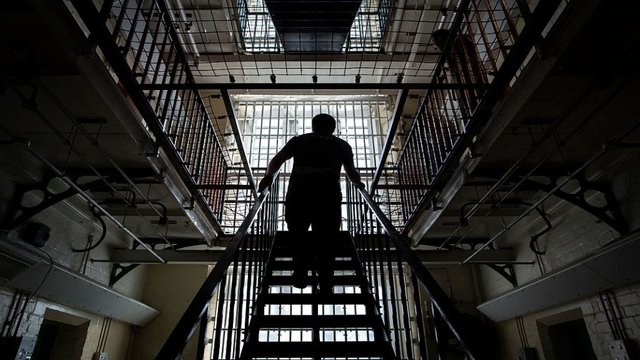
Real Criminal Justice Reform Happened Under Trump in a Bipartisan and Most Unlikely Fashion
It may end up being the only major bipartisan legislation passed in this term, but the Senate voted overwhelmingly yesterday, 87-12 and on bipartisan lines to approve the First Step Act, which is criminal justice reform legislation endorsed by President Trump.
The last time Congress passed legislation to reduce sentences was in 2010 when Congress reformed the racially disparate mandatory minimum penalties governing crack cocaine offenses. The First Step Act would make that law, the Fair Sentencing Act, retroactive.
The First Step Act now moves to the House for a vote.
Under the legislation, thousands of federal inmates will be able to leave prison earlier than their sentencing would indicate, they can secure early release based on credits for good behavior or participation in rehab programs.
The bill also eases some mandatory minimum sentences, gives judges more leeway to eschew certain sentencing guidelines and eliminates “stacking” provisions that leave offenders serving consecutive sentences for crimes committed with firearms.
“If this bill is the only step Congress takes, it will leave the important work of criminal justice reform substantially undone,” said Ames C. Grawert, a senior counsel at the Brennan Center for Justice. “But as a real ‘first step,’ the bill both changes the conversation — focusing on how we reduce federal prison sentences, not whether we do it at all — and offers a real, immediate benefit for currently incarcerated people.”
The Sentencing Project endorsed the legislation after visions in early November.
“The federal criminal justice system is facing a crisis because of overcrowded prisons, staffing shortages, unsafe conditions and harsh mandatory minimum sentences,” said Kara Gotsch, the  Project’s Director of Strategic Initiatives.
Project’s Director of Strategic Initiatives.
She added, “The Senate’s passage of the First Step Act is an important milestone in the long road to ending mass incarceration and curbing the excesses and harm in the federal justice system. Thousands of people will encounter a federal criminal justice system that is fairer and more humane because of the changes in the First Step Act.”
In a letter to Majority Leader Mitch McConnell, the ACLU called the legislation, “a next step towards desperately needed federal criminal justice reform, but for all its benefits, much more needs to be done. The inclusion of concrete sentencing reforms in the new and improved Senate version of the FIRST STEP Act is a modest improvement, but many people will be left in prison to serve long draconian sentences because some provisions of the legislation are not retroactive.”
The New Yorker pointed out that the support for this marks an interesting journey for President Trump. After all, in 2017, he told law enforcement officers on Long Island, “When you see these thugs being thrown into the back of a paddy wagon—you just see them thrown in, rough—I said, ‘Please don’t be too nice.’ ”
He added, “When you guys put somebody in the car and you’re protecting their head, you know, the way you put their hand over? Like, don’t hit their head—and they’ve just killed somebody—don’t hit their head? I said you can take the hand away, O.K.?”
The New Yorker noted that Mr. Trump has never recanted his support for executing the now-exonerated Central Park Five, but is backing the most significant criminal justice reform bills in decades.
“We’re all better off when former inmates can receive and reenter society as law-abiding, productive citizens,” President Trump said in remarks endorsing the bill last month. “And, thanks to our booming economy, they now have a chance at more opportunities than they’ve ever had before.”
The New Yorker notes, “That the bill has advanced this far under the Trump Administration reflects the purchase criminal-justice reform has gained not only among Democrats but also among conservative Republicans.”
Senator Mike Lee, last month in the National review, made the conservative case for the bell.
“Unlike some reformers, I don’t think our justice system is fundamentally broken, unjust, or corrupt,” Lee wrote. “I know from experience that dangerous criminals exist—individuals who are incapable of or uninterested in rehabilitation and change. . . . But my time as a prosecutor also tells me that not every criminal is dangerous or incapable of living a productive life,” he wrote. “My faith as a Christian teaches me that many people are capable of redemption. And my instincts as a conservative make me believe that the government can be reformed to work better.”
Meanwhile CNN called it “the bill that wouldn’t die.” The driving force behind the effort was Jared Kushner, the President’s son in law. He had invited among other people – Van Jones, the commentator and former Obama administration official and Kim Kardashian to the White House.
The problem that was bothering the president: Willie Horton. The President feared that if someone was released early and someone got hurt, it would backfire on him.
Mr. Jones explained: “He was afraid. He was concerned someone would get out, hurt someone and that would be the end of his political career.”
Every time Mr. Trump brought up Willie Horton, Van Jones and Kim Kardashian brought up Alice Marie Johnson, “a 63-year-old woman who had been serving a life sentence for money laundering and a nonviolent drug offense until Trump granted her clemency in June to broad acclaim.”
Ultimately out of that meeting, President Trump endorsed the bill and ramped up pressure on Senate Majority Leader Mitch McConnell – who had doomed similar efforts previously – to bring it to the floor for a vote.
CNN notes: “The timing is particularly noteworthy given that it comes as nearly every aspect of the President’s political and business life is under investigation, and substantive congressional policy making has practically ground to a halt.”
They also noted, “At times the bill seemed poised to fail. Yet at crucial moments a surprising political alliance emerged to keep it alive, one made up of social progressives, black Democrats, members of the religious right, fiscal conservatives and libertarians. The effort has proved so resilient this time around, opponents have dubbed the First Step Act the “zombie bill” for its refusal to die.”
—David M. Greenwald reporting






Wasn’t Jeff just saying this wasn’t going to happen?